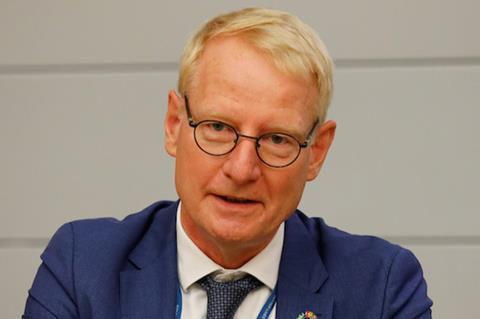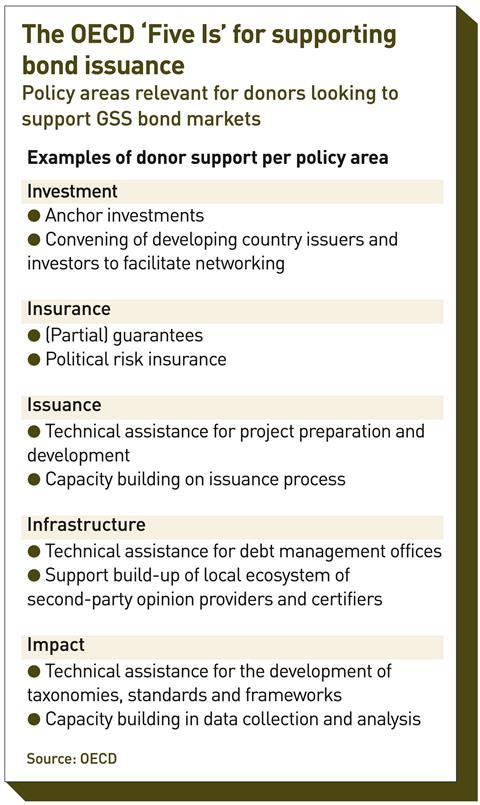Worth approximately $128.3trn (€117trn), the global bond market could add billions to the global effort to reach the United Nations’ sustainable development goals (SDGs). Yet only a fraction of the market currently consists of green, social and sustainability (GSS) bonds, and of that very little is being issued in developing countries. In 2022, annual GSS bond issuances stood at under 10% of overall bonds and only 13% of them came from entities in developing countries, a number that dwindles to around 5% when excluding issuers from China.

GSS bonds differ from traditional bonds in their more limited fungibility, as they relate to projects or assets that are focused on sustainable, social or environmental goals. The potential and importance of GSS bonds has been recognised by several major international organisations, including the G20.
While the GSS bond market has grown considerably over the last years, issuance is not happening where the financing needs for sustainable development are most urgent, particularly from entities in low-income or lower middle-income countries. In 2022, high-income countries made up 73% of issued amounts, with most coming from upper middle-income countries. Significant regional disparities can also be observed; in 2022, Europe, for example, issued over 70 times more in value than sub-Saharan Africa, which represented only 0.7% of the global GSS bond market.
Bond obstacles
Issuers in developing countries face several roadblocks in issuing GSS bonds, ranging from the lack of sizeable bankable projects, to limited familiarity with international investors and weak regulatory frameworks. There is also often a lack of technical knowledge.

Donor governments and other institutions are already supporting issuers in developing countries to tackle these challenges through different initiatives. There are, for example, technical assistance programmes aimed at developing taxonomies and GSS bond standards or specific investment approaches that focus on GSS bonds in emerging markets and developing economies.
However, these efforts have so far lacked co-ordination, resulting in a limited contribution towards sustainable development. To address this, donors need to act in a strategic manner across five policy areas: investment, insurance, issuance, infrastructure and impact, known as the Five Is.
The Five Is show the many ways governments can support the development of GSS bond markets. This may range from supporting the originator of the bond in the issuance process, to ensuring reliability, clarity and accountability of impact measurement and reporting.
Blended finance, which is where development finance is used to mobilise additional money for sustainable projects, has also been employed across several of the Five Is – with for example, the provision of a risk cushion to reassure investors, including senior commercial bond investors. Other blended finance instruments have also been used by development actors, such as credit enhancing mechanisms, and taking on credit or political risk of GSS bond issuances.
Despite successes in using blended finance, a truly co-ordinated and concerted push is not discernible. Co-ordination is essential because the bond market requires sizeable transactions: unless development organisations come together to deliver them, they are unlikely to occur.
More needs to be done
There are few ongoing joined-up initiatives and they are smaller projects that include guarantees or first-loss instruments. More needs to be done, especially in sub-Saharan Africa because current initiatives are not creating the precedents and market evolution necessary to attract institutional investors, and mend the significant SDG-financing gaps in the region.
In that context, here are three overarching messages for donor governments and organisations:
● Co-ordinate efforts for large-scale blended finance instruments targeted at GSS bonds. This means, for example, investing jointly in first-loss mitigation in the form of funded junior, mezzanine tranches in large fixed-income funds or through joint guarantee programmes.
● Support the harmonisation of impact measurement and reporting. This can be done by promoting the comparability and interoperability of taxonomies, standards and principles, and encouraging the harmonisation of high-quality impact measurement and reporting on GSS bonds. This requires donors to find consensus on what is best practice, while leaving room for local considerations where necessary.
● Develop a strategic co-ordination mechanism for GSS bonds, facilitated by a task force convening donor, their financial institutions, developing country representatives and private bond investors.
GSS bonds can be an important tool to finance sustainable development projects and helping them not to fall short of their potential. By responding to investor appetite for sustainable investment opportunities, donor governments and organisations have an important role to play in correcting this.
Haje Schütte is deputy director in the development co-operation directorate in the Organisation for Economic Co-operation and Development (OECD)


















